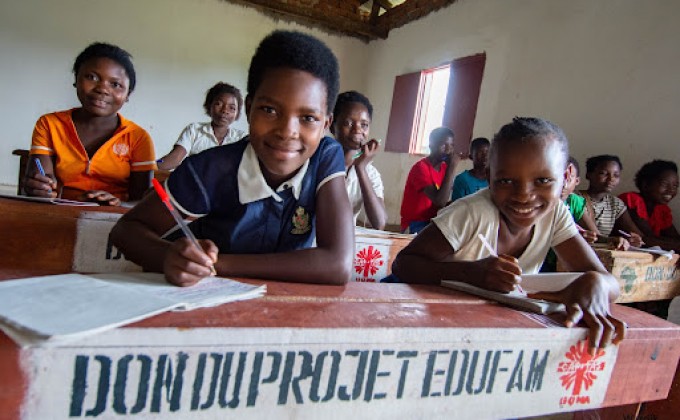
Using a holistic and feminist approach, EDUFAM implements innovative approaches at the individual, household, school and community levels to reach more than 22,000 girls, adolescents and women in the Democratic Republic of Congo, Rwanda, and Burundi.

The three main innovative approaches put forward by ÉDUFAM are 1) the individualized support system, 2) social contracts, and 3) the model of centers of excellence / gender responsive schools.
The individualized support system allows for the personalized follow-up of 3,300 particularly vulnerable girls and teenagers by a network of 100 community relay women trained in feminist intervention. A census conducted prior to the project, at the individual and household level, identified these girls according to a previously established vulnerability index. For each of the targeted girls and adolescents, an individual support plan is developed with them, according to their situation, specific obstacles and aspirations in relation to their educational path. This regular follow-up offered by the women community relays allows these vulnerable girls to be accompanied in various ways, either to return to or join school, notably through remedial education initiatives, to join a training and professional integration program for young (older) women who have dropped out of school and for whom it is not possible to return to school, or to continue schooling for girls who are particularly at risk of dropping out of school, by supporting them with schooling grants, school kits, or mentoring initiatives. The scholarships are designed to encourage girls to continue their studies in the science, mathematics, and technology (SMT) streams of upper secondary school and to ensure their success in the pivotal or government exam years.
At the end of the second year of the project, results can already be attributed to this innovative approach:
The social contracts are based on an existing conflict resolution approach, adapted within the framework of the ÉDUFAM project to support communities in addressing issues and barriers that impede the rights of girls, adolescents and women, particularly in accessing and remaining in school. It is a participatory process in which all community stakeholders are involved, including influential people (political and religious leaders, etc.), and which generates written documents translated into local languages presenting the concrete commitments made by the community to reduce or eliminate social and structural barriers to girls' education. The goal of these social contracts is to place community responsibility at the heart of the actions and to encourage social accountability in relation to these commitments so that girls' education and the respect of their rights become a priority for the entire community. The application of each social contract is guaranteed by a monitoring committee composed of 25 to 30 people, elected, trained and equipped to implement a system of alert, reporting and application of the commitments of the social contracts, in the host and refugee communities. To date, the following results can be attributed to this innovative approach:
The centers of excellence/gender-responsive schools are the result of a model developed by FAWE (Forum for African Women Educationalists), a partner in the EDUFAM project, which aims to transform ordinary schools into gender-responsive schools. Schools must provide quality education and pay attention to the physical, academic, and social dimensions of girls' and boys' education in order to promote greater retention and performance of girls and adolescents. The ÉDUFAM project builds on this approach in 24 targeted schools in Rwanda, Burundi, and the DRC.
To this end, EDUFAM supports schools in implementing the eight criteria established by FAWE to become a gender-responsive school:
The following results reflect the positive impact of this innovative approach:
Overall, the complementarity of these three innovative approaches has improved the empowerment of girls, adolescents and women by 15% after two years of project implementation. By the end of the project in 2024, ÉDUFAM can look forward to even more promising results in order to contribute to the achievement of the commitments of the Charlevoix Declaration on Quality Education for Girls, Adolescents and Women in Developing Countries.